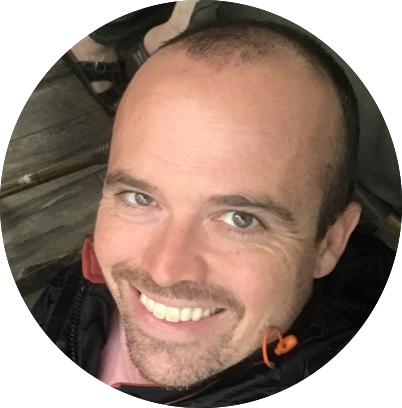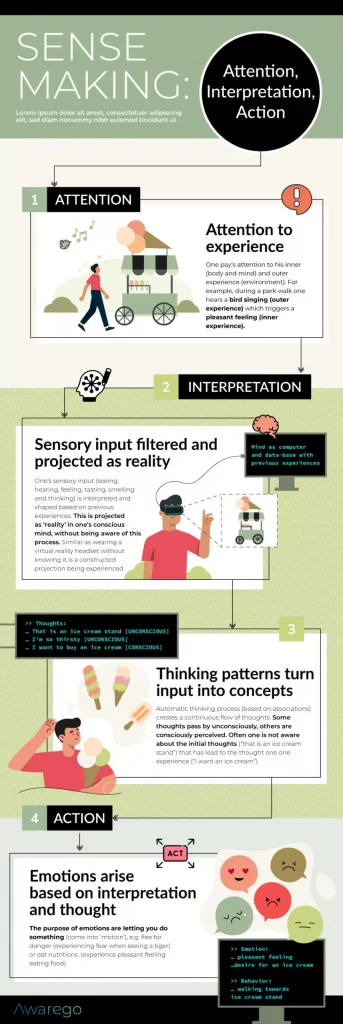

The Stages of Transformational Leadership Development
How companies can incorporate adult development
stages in their transformational leadership development
Author: Arthur Lankester
October 27th, 2021
Tools: Sense-making (infographic)
- 5 mins read
- Video
Humans are natural meaning-seekers who try to dissect and construct their realities in an effort to make sense of what’s happening around them. We’re continuously constructing our respective realities. During this meaning-making process, we’re particularly selective about what we sense and perceive, and we’re all doing it differently from one another.
Only 5% of leaders have the capacity to see a complex system and work into it. They have the capability to embrace transformational leadership and create an environment that’s conducive to growth, progress, and results.
Three steps of sense-making
This innate need to understand everything is part of the way we evolve as leaders. David Rooke, in his engaging talk on Transformational Leadership, highlights the three stages of sense-making:
1- Attention
At this stage, we’re selective in what we notice or pay attention to.
2- Interpretation
Interpretation is what fuels sense-making.
3- Action
Action is based on behavioral patterns or habits and what we sense, which is a product of attention and interpretation.
Attention and interpretation propel you to take action. What you pay attention to and what sense you derive from it all play a role in shaping the way you lead.
“99.5% of time sense making process is unconscious process.” – David Rooke
Developmental Stages and Leadership
Adults go through developmental stages that play a key role in our individual leadership styles. Rooke’s leadership development framework echoes and builds on Jean Piaget’s ideas about a child’s cognitive development. In Piaget’s theory, how children think differ greatly from the way adults think. Children are able to move through various anticipatable stages, which increases in complexity, as they engage with the world around them. These stages continue throughout our adult life and are considered as adult developmental stages.
Following Piaget’s theory, Rooke has developed a set of developmental stages for leaders. Which he calls “action logics”.
5 Action logics defined
Action logic is how a person interprets what’s going on around them and how they choose to react when challenged by or thrust into unfamiliar scenarios. Action logic is the internal sense making. It’s how we derive meaning from the things around us, including ourselves and our environment, and action logic plays an important role in how we perceive, go about, and react to occurrences in our daily lives.
Diplomat
- David Rooke considers the Diplomat as a perfectly functional adult stage. It’s defined by fitting in and conforming and is ideal for everyday functions. However, Rooke adds that it’s not an ideal action logic for leading because of the conflicts that arise, which may make it difficult for the diplomat to fit in.
Expert
The Expert action logic is defined by an individual’s ability to bring a high degree of focus to something that they consider to be their craft.
Achiever
Most leaders are profiled as Achievers and are focused on getting and delivering results. The Achiever is a tremendously important action logic because without it, we’d be full of dysfunctional organizations.
- Redefining
The Redefining-type or Individualist action logic is characterised by a questioning nature, and this can both be an advantage and a disadvantage, as individualist team members may find it difficult to feel like they’re on board.
Transforming
The Transforming-type or Strategist is valuable as they’re able to perceive things in a new way. They have the unique ability to see things in context, allowing them to learn from past events, consider the present, and envision the future.
6 Key Redefining Capabilities
Rooke suggests six key transforming-type capabilities that are worth being nurtured, whether you’re profiled as an expert, an achiever, or a redefining-type:
1) Inquiry-based experimentation
Leaders should have the capacity to adopt an inquiring approach. They must be willing to ask questions and experiment in order to do things differently.
2) Sliding between the big picture and small details
Leaders should be able to seamlessly transition from paying attention to little details to looking at the big picture. Pay attention to both the vision and the particulars because, according to Rooke, these small details form the vision.
3) Courageous use of power
A transformational leader has the courage to tell the truth to authority.
4) Positive use of language
Transformational leaders are able to bring positivity to their brand of leadership, enabling them to appreciate what’s working while remaining critical of what’s ineffective. This is key to starting the process of transforming your organisation.
5) Taking systems leaderships
This requires you to essentially act into the system and prepares you to become a systems leader and to take on everything that comes with it.
6) Passionate detachment
You should be passionate, but you should also be able to cultivate the ability to be detached. This gives you balance and an ability to be more objective.
Do you want to learn more about transformational leadership, read more about Awarego’s Framework for Adult Leadership Development (FALD)? Or watch David Rooke’s enlightening presentation in the video on this page.
Gain more insight by signing up for our newsletter and learn more about how you can transform yourself and your workplace.

MEET THE AUTHOR
Arthur Lankester
Arthur Lankester is a passionate trainer and coach helping individuals and organisations in developing ‘transformational capabilities’. Simply said, Arthur help’s people to develop skills to go through complex personal or organizational changes’. Arthur is graduated (Msc.) Psychologist and Master of Business Administration.
Add your email to the mailing list to get the latest updates.
Join Our Community
Stories
- Culture 4
- E-learning 1
- Leadership 4
- Personal development 2
- Transformation 5
- Vertical development 1







